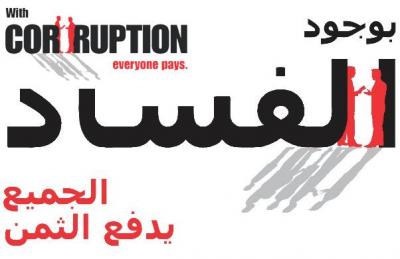 CAIRO: Showing their efforts and commitment to fighting the different forms of corruption in the country, Egypt’s Ministry of State for Administrative Development celebrated International Anti-Corruption Day, in cooperation with the United Nations Development Program (UNDP) and the United Nations Office on Drugs and Crime (UNODC).
CAIRO: Showing their efforts and commitment to fighting the different forms of corruption in the country, Egypt’s Ministry of State for Administrative Development celebrated International Anti-Corruption Day, in cooperation with the United Nations Development Program (UNDP) and the United Nations Office on Drugs and Crime (UNODC).
Egypt celebrates International Anti-Corruption Day
By-Safaa Abdoun /Daily News Egypt
Top Stories
00:12
Sunday ,12 December 2010

The event was held under the slogan “Education’s Role in Reinforcing Transparency and Integrity” with attendees comprised of students, officials from the Ministry of Education, educational experts, and ambassadors.
“This is our fourth year to celebrate the International Anti-Corruption Day, and this year we are joining forces with the Ministry of Education,” said Minister of State for Administrative Development Ahmed Darwish.
“The Egyptian Constitution of 1971 has numerous articles — such as 8, 18, 20, 21 and 40 — all of which address equal opportunities for all citizens, particularly in education, human rights and how all are equal in front of the law,” he added.
Officials and experts have explored the effectiveness of education on spurring Egyptian youth to be well behaved and on raising their awareness about the outcome of corruptive behavior. The resulting general consensus was that schools alone can’t accomplish this goal; society as a whole must also play a significant role.
“Schools instill morals in students, and teachers act as role models,” noted Darwish. “However, it takes society as a whole to reinforce it all.”
“The great focus on grades rather than the learning process drives students towards corruption by means such as cheating,” said writer Yacoub El Sharouny. “Moreover, [the students] see their parents facing hardships in life and they think, ‘if my dad [wasn’t] honest, he wouldn’t be [experiencing] these hardships.’”
“The school is the backbone, instilling the morals of transparency and integrity in the students as they [grow] up,” said Deputy Minister of Education Reda Abou Sere’a. “However, the different players in society — such as the media — also have a key role to play.”
Executive Director of the UNODC Yuri Viktorovich, who is also the director-general of the UNODC office in Vienna, was present at the event.
“Corruption is another form of crime, [although] it has regional and local [components] which need specific campaigns to address,” said Viktorovich.
Viktorovich quoted UN Secretary-General Ban Ki-moon in his message aimed at urging the international community to take action against corruption: “I call on business leaders worldwide to denounce corruption and to back their words with strict prohibitions against it. They should adopt anti-corruption policies in line with the United Nations Convention and put in place the necessary checks to strengthen integrity and transparency. I also urge corporations to work more closely with the United Nations on this issue.”
Having the executive director of the UNODC choose Egypt to celebrate the International Anti-Corruption Day sends the message to Egyptians that they must put our feet on the right path, said Darwish.
Viktorovich commended the efforts taken by Egypt to fight corruption, as well as Darwish’s efforts in establishing the e-governance anti-corruption program and in promoting more ethical forms of governmental administration in general.
Egypt was among the first to sign the UN Convention against Corruption, which is the first global and legally binding anti-corruption instrument. It was put into effect on Dec. 14, 2005 and covers the most important facets of anti-corruption work: prevention, criminalization, international cooperation, and asset recovery.
“More transparency is more ability to attract investment, which hence creates more employment opportunities, more taxes and hence a better social security network,” Darwish said.


